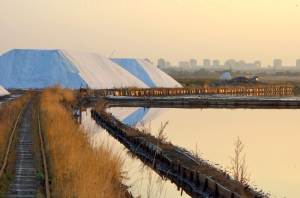
WORTH ITS SALT – FOR YOU AND THE PLANET

Lake Atanasovsko, Bulgaria
Lush’s iconic self-preserving Ocean Salt face and body scrub is a best-seller; for the 12 months from May 2021 to April 2022 Lush customers over 510,000 pots! The top ingredient in this product? Fine sea salt. By responsibly sourcing this ingredient and harnessing its self-preserving properties, Lush’s cult face and body scrub benefits the environment and consumers.
Cleansing the skin with fine sea salt is an excellent way to benefit from its exfoliant, antimicrobial and astringent properties without stripping away too much natural oil. Sea salt is also used in hair care products to increase volume and shine.
As well as its properties for humans, when sourced responsibly, using sea salt can have a positive impact on the environment, supporting biodiversity and helping protect salt marshes and salt pans which play an important role in Earth’s ecosystems, and providing a natural alternative to synthetic preservatives; which can damage aquatic ecosystems.
Natural products benefit the natural world
Salt is a natural preservative that can help to keep products clean and free from micro-organisms when used in appropriate quantities. The huge number of synthetic preservatives that are used to give cosmetics that long shelf life do not break down in water, meaning they bioaccumulate and damage aquatic life forms. Lush use minimal preservatives in their products when they have to and have been working hard to remove preservatives from products wherever they can over the decades. These versions are just as effective with all the goodness and no preservative content.
Synthetic preservatives stop things decaying in the environment, so when people use them they are going down into water systems. But materials like honey, salt and kaolin will break down by themselves and not harm the environment in any way. So creating fresh products also reduces the amount of preservative entering water sources and even human tissue.
Biodiversity is the salt of life
Lush purchases sea salt from salt pans all over Europe. Our fine sea salt comes from pans in Turkey, Portugal, Croatia and Bulgaria. In Bulgaria, we use the fine sea salt from Lake Atanasovsko, Bulgaria – an essential stop on the Via Pontica, Europe’s second-largest bird migration route.
The salt marshes of Lake Atansovsko support biodiversity with more than 300 of Bulgaria’s 420 bird species taking refuge here, including the Dalmatian pelican and thanks to careful conservation their numbers are increasing. The reason Lush buys salt from salt pans is because of their crucial link providing a safe stopover, feeding, and breeding ground for migratory birds.
Lush has backed a project which started in the winter of 2017 with the goal of protecting the pelicans of the salt pan, which has led to the creation of an artificial island, (measuring 8,100m sq), on Atanasovsko Lake that was designed specifically for the pelicans that have found it hard to settle on the other two lakes in the complex.
Lush was connected to their salt suppliers by the charity BirdLife International. BirdLife are a global partnership of conservation organisations that focus on conserving birds, their habitats and global biodiversity whilst working with people towards sustainability in the use of natural resources. There are currently 121 BirdLife Partners worldwide. The problem is that salt pans are gradually becoming an endangered habitat. In order to stop their abandonment, BirdLife partners along the East Atlantic flyway have teamed up, aiming to restore and promote nature and bird-friendly management practices in saltpans.
Lush works with salt suppliers that have all been recommended through BirdLife to ensure we are supporting the best suppliers and projects.
To find out more about Lush’s buying team and where we source ingredients, click here
Bring it Back … Remember to bring your empties back to your nearest Lush shop and we will give you money for them! For any Lush plastic packaging you return to us, we will give you 50p per item off of your shop that day and then send it back to our Green Hub to close the loop and get them turned back into more black pots. In the past year, we’ve had just over 17 tonnes of plastic returned to us, that’s plastic that could have ended up in the ocean.
For further information or for interview opportunities, please email lushpr@lush.co.uk
12:11
